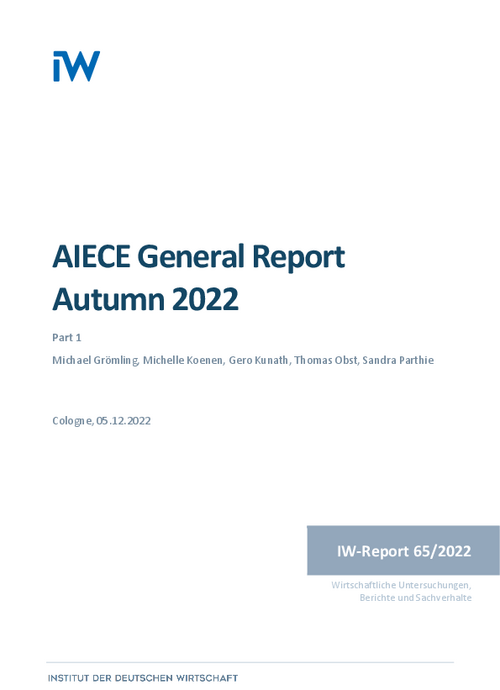Private households, companies and governments in Europe are facing enormous challenges. First, far-reach-ing transformations in economic life are on the horizon for the current decade and beyond. Demographic developments are exacerbating the shortages of skilled workers that already exist in many economies and reinforcing the associated obstacles to production.

AIECE General Report Autumn 2022 Part I

Private households, companies and governments in Europe are facing enormous challenges. First, far-reach-ing transformations in economic life are on the horizon for the current decade and beyond. Demographic developments are exacerbating the shortages of skilled workers that already exist in many economies and reinforcing the associated obstacles to production.
Climate change requires fundamental societal and eco-nomic changes. Technological progress and the many dimensions of digitalisation are putting business mod-els across all sectors under considerable pressure to modernise. And last but not least, the efficiency and productivity potentials that we have been accustomed to for a long time can obviously no longer be reaped from more intensive international cooperation.
Second, the pandemic and the war in Ukraine are creating additional and unprecedented adjustment burdens in many countries. The Corona pandemic was accompanied by immense strains on the supply and demand side of the economy: Production processes were widely disrupted by missing workers and disrupted supply networks. Demand came to a standstill as a result of lockdowns – especially in the personal ser-vices sectors. With the continuing success of vaccination against Corona, consumption and exports returned to normal. However, global supply networks are still not running smoothly. Production and logistics are still affected by the pandemic. As a result, investment activity has failed to return to pre-crisis levels.

AIECE General Report Autumn 2022 Part I


Berliner Gespräche Frühjahrstagung: Zwischen Sicherheitspolitik, Green Deal und Wettbewerbsfähigkeit – eine europapolitische Bestandsaufnahme
Das Institut der deutschen Wirtschaft möchte Sie erneut zu einer virtuellen Variante der „Berliner Gespräche” einladen.
IW
Die Zukunft Europas: Welche Prioritäten sind für die Wettbewerbsfähigkeit entscheidend?
Die Europäische Union hat ihre neue strategische Agenda für die Jahre 2024 bis 2029 veröffentlicht. IW-Direktor Michael Hüther und HRI-Präsident Bert Rürup analysieren im Handelsblatt-Podcast „Economic Challenges” die Bedeutung der Wettbewerbsfähigkeit für die ...
IW